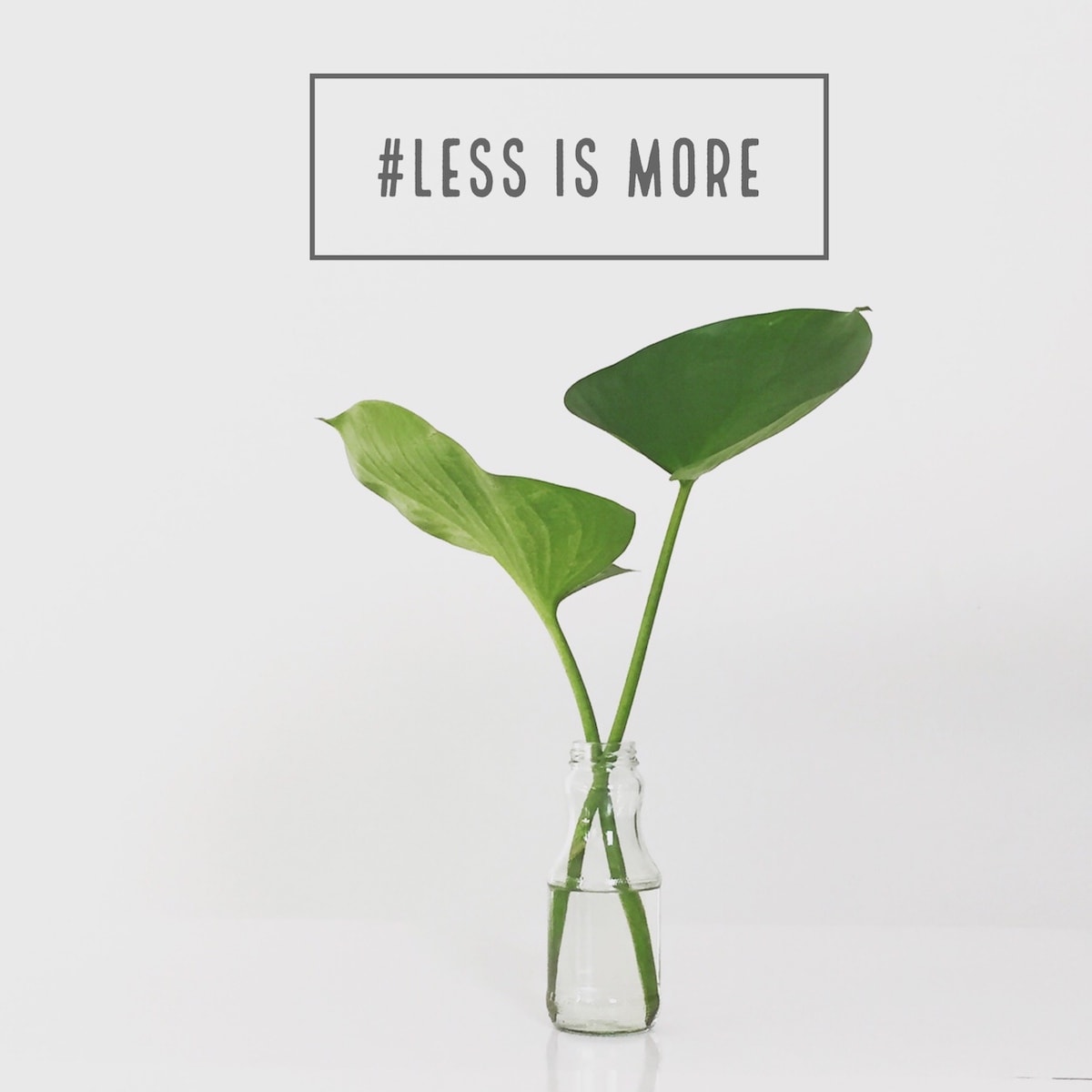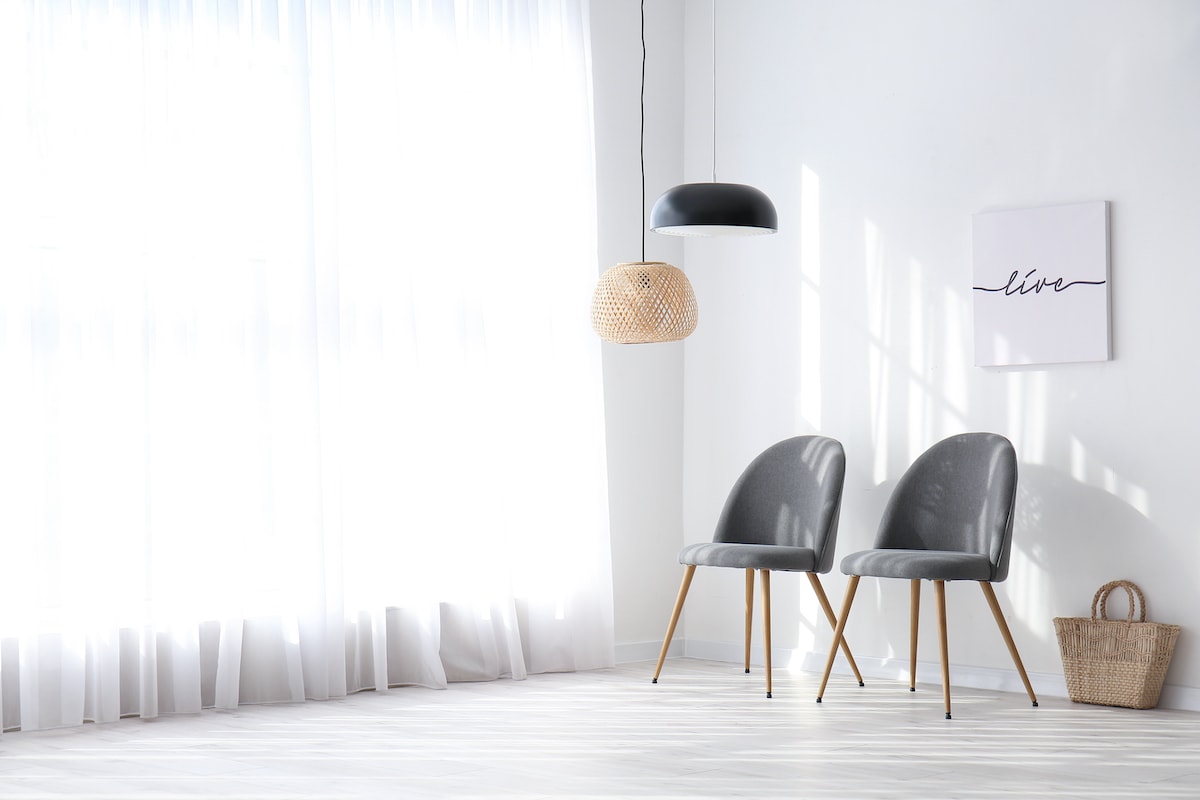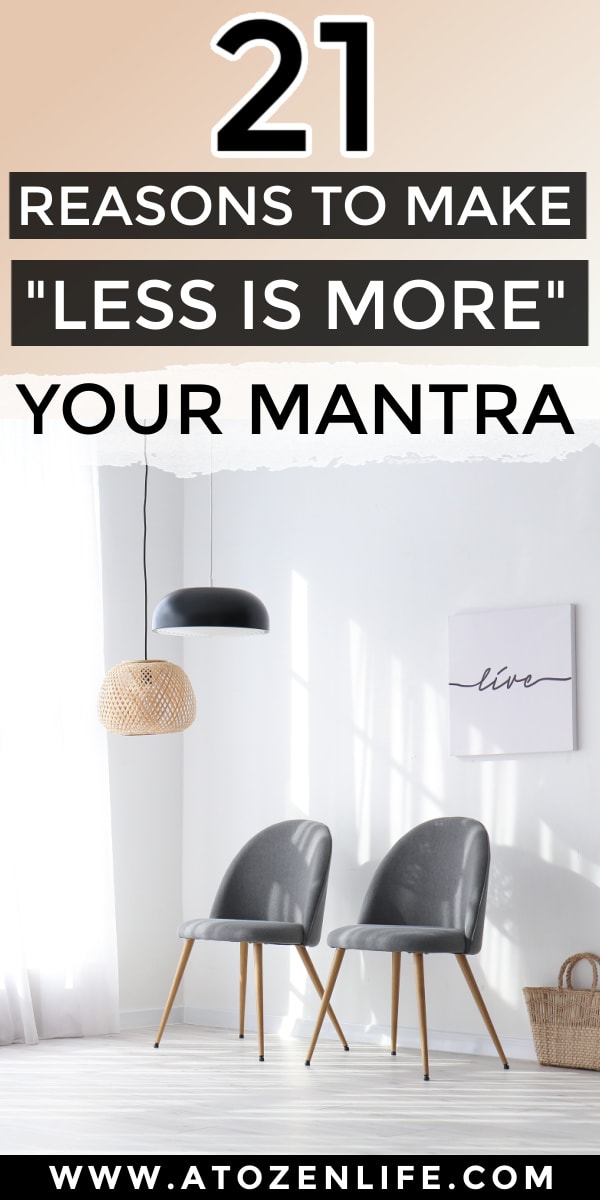Less is More: 21 Reasons to Make It Your Life’s Mantra
This post may contain affiliate links for your convenience. That means that if you make a purchase, I will receive a small commission at no extra cost to you. Read more here.
What does the phrase “less is more” mean to you? As more and more people embrace the concepts of minimalism and simple living, they are opening up to accepting the revolutionary idea that “more” isn’t necessarily a good thing.
After all, always wanting more can rapidly morph into owning too much, which means more stress, less money, and reduced life satisfaction.
Find out the true origins of the less is more ideal and explore all the reasons to make it your mantra for life.
Who said less is more – and why does it matter?
The phrase “less is more” can be traced back to a poem titled “Andrea del Santo” by Robert Browning, which was written in 1855 as part of an anthology of poems.
However, the phrase was later popularized and is more commonly attributed in the modern sense due to the words and work of German-American architect Ludwig Mies van der Rohe.
He sought to reduce architectural design and concepts into their simplest forms, with clean lines, a focus on geometry, and plenty of white, empty space. Mies van der Rohe is considered to be one of the fathers of the modern minimalist aesthetics in architecture.
The modern meaning of less is more is strongly related to anti-materialism and minimalism, which focus on surrounding yourself with the things you love and value and letting go of all the rest.
BE INSPIRED: 120 Minimalist Quotes to Simply Live Your Best Life in 2022

21 LESS IS MORE EXAMPLES
As someone who extreme decluttered 95% of my possessions and moved to Europe, I can attest to the power of “less is more”.
Having a less is more mindset can be tough because often you have to challenge your core values and beliefs.
Living in a consumeristic society means that every day you are bombarded with messages about how you need this or that product to find true happiness. Or you might feel like you need to hold onto things because they have sentimental value or you are afraid that you are wasting money by getting rid of them.
But studies have shown over and over again that it isn’t our things that make us happy, but our relationships and experiences.
Here are all the ways less is more can change your life – if you let it!
FIND OUT MORE: How to Declutter Sentimental Items: 20 Tips to Make Letting Go EASIER!
1. Less furniture = more open space
If you’ve been holding onto large furniture items that take up a lot of space in your home, it might be time to let go.
Imagine removing all the extra junk from your basement and turning it into a small ballet studio or entertainment zone for your kids. Or finally emptying your garage of all the excess and being able to park your car inside!
No matter if you live in a 5-bedroom home or a tiny minimalist apartment, less furniture equals more open space, which instantly creates new possibilities.

2. Less clutter = more calm
Science has proven that clutter increases cortisol levels, which are associated with anxiety and stress.
Have you ever wondered why hospitals tend to keep their interiors basic, with only minimal decor? It’s to give their patients peace of mind. Trade the clutter for more calm, and your mental health will thank you for it.
READ MORE: 10 Surprising Benefits of Minimalists That Are Actually Backed by Science!
3. Less clothing = a simpler wardrobe
Are you familiar with the term “capsule wardrobe”?
A capsule wardrobe typically contains 20-30 items. This means less space taken up and less time spent doing laundry or choosing what to wear, which leads to easier choices in the morning!
Even if you don’t want to pursue a capsule wardrobe, decluttering your clothing can still free up a lot of extra time and space in your closet. You can even sell clothes online to make some extra cash!
FIND OUT MORE: This Family of 4 Made $50,000 Selling Clutter – Here’s How!
4. Fewer options = easier choices
Have you ever stood in front of a wall of foods at the grocery store and felt confused about what to buy because there was just too much?
You are not alone!
Studies have shown that having more options can leave you feeling overwhelmed.
When you pare down your choices, they become much easier. It’s common sense that it will be simpler to choose what to wear in the morning and which mug to drink coffee from when you are given just two choices instead of ten!
5. Less spending = more saving
This is the most essential financial rule: “spend less, save more.”
If you have toxic money habits such as impulse shopping or racking up too much debt to buy stuff you don’t really need, you need to change your behavior pronto.
Here are some things you can do:
- Detox your finances with a no-spend challenge
- Study effective ways to stop impulse shopping
- Track your spending for 30 days
- Create a minimalist budget that fits your lifestyle and goals
- Practice intentional buying and mindful spending habits
READ MORE: 10 Tips to Stop Impulse Buying and Save More Money
6. Less quantity = more quality
This principle doesn’t only apply to choosing one luxury item over ten cheap products. It can apply to everything.
Would you rather go on one excellent date a month or four so-so dates every week? Would you prefer to go on all-inclusive holidays in the summer, or travel each quarter to places you’re not so convinced about?
When you are more selective with your choices you’ll find yourself more satisfied with the results.
7. Less waste = a happier planet
Did you know that we generate billions in textile waste alone each year with all the shopping we do and the clothing we throw away?
It’s no wonder our planet is screaming at us to stop!
If you buy less, live more minimally, and reduce consumption, you can also reduce waste and pollution that is damaging our environment.
8. Less screentime = more living
The digital generation is extremely busy most of the time.
Busy doing what? Well, not much of anything, really.
All that mindless scrolling and binge-watching of TV shows that force people to race against the clock to do everything that they have to. Fortunately, you can reclaim your free time by making a conscious decision to limit screentime and find more time to actually live your life.
9. Less digital clutter = digital space
Storing endless files on your drive not only slows down your device but adds additional chores to your lengthy to-do list, as well: clean the desktop (and the mailbox), delete duplicate photos, read the books stored on your Kindle…
Free yourself from digital clutter; your devices will work faster and you’ll gain digital space for what truly matters.
START NOW: 8 Genius Ways to Declutter & Organize the Apps on Your iPhone
10. Less to do = more time for you
The fastest way to get more time for yourself is by limiting the number of things you have to do.
That doesn’t mean neglecting responsibilities, no.
Instead, it’s an invitation to take an honest look at your weekly schedule and cross out everything that’s not essential.

11. Less feeling spread too thin = more life satisfaction
This point is somewhat related to point 10.
By giving up on certain duties and setting proper boundaries, you’re protecting yourself from feeling spread too thin. This can make you significantly happier. Your life was always meant to be yours – and not other people’s!
12. Less comparison = more connection
The pressure to keep up with societal expectations can sometimes feel overwhelming. It leads to feelings of anger, inadequacy, and envy; and these aren’t conducive to building empowering connections.
Do yourself a favor and compare less.
FIND OUT MORE: Top 20 Be Yourself Quotes for Embracing the Skin You’re In!
13. Less PAST & FUTURE = more BEING PRESENT
Dwelling too much on the past or continuously worrying about what’s going to happen to you in the future can hold you back in the present in the now.
Cherish and learn from the past, but don’t let it stop you from moving forward. Likewise, it’s okay to make plans and have goals for yourself, but also allow yourself to go with the flow.
Our life rarely follows the path that we plan for ourselves, and there are always going to be circumstances outside of your control, so let go of the things you can’t control and focus on the things you can.
14. Less seeking outside advice = more trusting your inner voice
Listening to one’s intuition isn’t easy, especially when there’s plenty of noise all around.
People will always give you advice, but they are not you, and often, their words may create more confusion than benefit. Don’t let this happen. Trust your inner voice, and as a result, your self-confidence will grow naturally.
15. Less talking = more listening
Talking is easy; listening is hard.
But it is listening that ultimately helps us tune into the other person’s feelings and connect to them. Strive to talk less so you can listen more, and your relationships will instantly improve.
READ MORE: 200+ You Are Amazing Quotes to Delight a Loved One Right Now
16. Less planning = more action
Do you ever spend tons of time making plans that never come to fruition?
Maybe you decide, “I’ll learn to play guitar” or “I’ll go mountain climbing,” but then you get overwhelmed by life or analysis paralysis and never get around to doing the things you want to do.
If you tend to get stuck in the planning phase, let go of your need to control and opt to be more spontaneous instead!
17. Less fear = more courage
Having courage in life isn’t about being free from fear – rather, it’s about stopping the fear from controlling you.
Consciously adopt a courageous attitude and the fear will dwindle by itself.
18. Less anxiety = more peace of mind
Anxiety can be debilitating sometimes – I know, easier said than done, right?
However, a mindful decision to limit ruminating is a good recipe for creating more peace of mind for yourself.
In his book titled “Rewire Your Brain,” John B. Arden proves that the brain can unlearn disturbing thoughts if the person focuses on other activities – even as simple ones, as studying languages or exercising. (And don’t forget to get rid of old clutter – it also induces worry.)

19. Less judging = more accepting
Judgment is a double-edged sword.
When you judge others you can also reveal the good, the bad, and the ugly thoughts and beliefs inside yourself.
While it’s impossible to stop being judgmental towards yourself and others 100% of the time, attempting to curb this habit will help you become more accepting, and with acceptance comes peace of mind.
20. Less bad habits = healthier lifestyle
Our daily choices become habits – and habits become our life.
If you find yourself partying every other weekend, drinking and smoking, you can’t expect yourself to be in great shape. And if you keep missing workouts and binge eating more often than not, it will be hard for you to get the healthy body you’re dreaming about.
Quitting a bad habit is rarely simple; it can be very challenging! Remind yourself that the hard work you do now is going to pay off in a happier, healthier, and better life later.
“What you aren’t changing, you’re choosing.”
READ MORE: 25 Simple Ways to Be Intentional with Your Life and Habits
21. Fewer toys = smarter kids
It might seem counterintuitive, but fewer toys might mean smarter, happier, and more creative kids!
A simple study conducted by the University of Toledo showed that giving children fewer toys led to more creative play, as the kids played with toys long enough to develop various ways of playing.
GET STARTED: How to Declutter Toys (and Make Kids Smarter) with the KonMari Method
Final thoughts on why less is more
I hope you enjoyed this list of less is more examples!
What matters most to you in your life?
You might not want to implement all of these ideas at once, but even a few small changes can help make a positive impact in curbing overconsumption, and reclaiming your time and space, so you can start living your dream life this year!
Watch the video!
Pin this “Less is More” post to read again!



I love this list, Marissa, and they ALL resonate with me! As a fellow minimalist for the past 5 years, I can’t think of any area of mine and my family’s life that hasn’t benefitted from ‘less is more’. On a personal level, I think the first place I started – with my wardrobe – has probably had one of the biggest effects for me. Now, as well as having less stuff I never wear, I know what suits me, so I avoid buying things I regret…most of the time, anyway ; )
Most of the time is key! 🙂 Thanks for sharing your thoughts, Kate.